Consistent Deep Restorative Sleep Is The Most Important Thing for reducing chronic pain, fatigue, brain fog, IBS, RLS, and other symptoms associated with fibromyalgia.
Use this Sleep Chart To Fix Your Poor Sleep
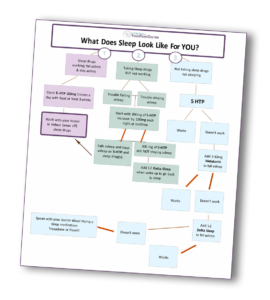
Get your copy of my Sleep Flow Chart, with direct links to read more about the products I recommend for my patients, and anyone who is struggling with getting a good night’s rest:
Irritable Bowel Syndrome – Eliminated In 2 Weeks With My natural Protocols
FREE JUMPSTART YOUR HEALTH TRAINING SESSIONS.
TODAY’S TRAINING: Overcoming GI Disorders-Step-By-Step Protocols For Reflux, Heartburn, Bloating, Gas, Constipation, Diarrhea, And IBS

EACH TUESDAY, NOON CDT
Join me Today, 4-21, and Next Tuesday, 4-28 | Over the next few weeks I’ll be sharing 20 years worth of expert fibromyalgia advice, for FREE!
IBS What You Need To Know

Some experts, recognizing that many go undiagnosed, suggest that irritable bowel syndrome (IBS) affects approximately 10–20% of the general population. The majority of patients I see for fibromyalgia suffer with IBS.
Irritable bowel syndrome is characterized by a group of symptoms in which abdominal pain or discomfort is associated with a change in bowel pattern, such as loose or more frequent bowel movements or diarrhea, and/or hard or less frequent bowel movements or constipation.
We know that gender plays a clear role, as more than 80 percent of IBS patients are women between 20 and 55 years old.
The criteria for diagnosing IBS is based on the newly modified Rome criteria (Rome II criteria) as the presence for at least 12 weeks (not necessarily consecutive) in the preceding 12 months of abdominal discomfort or pain that cannot be explained by a structural or biochemical abnormality and that has at least two of following three features:
(1) pain is relieved with defecation, and its onset is associated (2) with a change in the frequency of bowel movements (diarrhea or constipation) or (3) with a change in the form of the stool (loose, watery, or pellet-like).
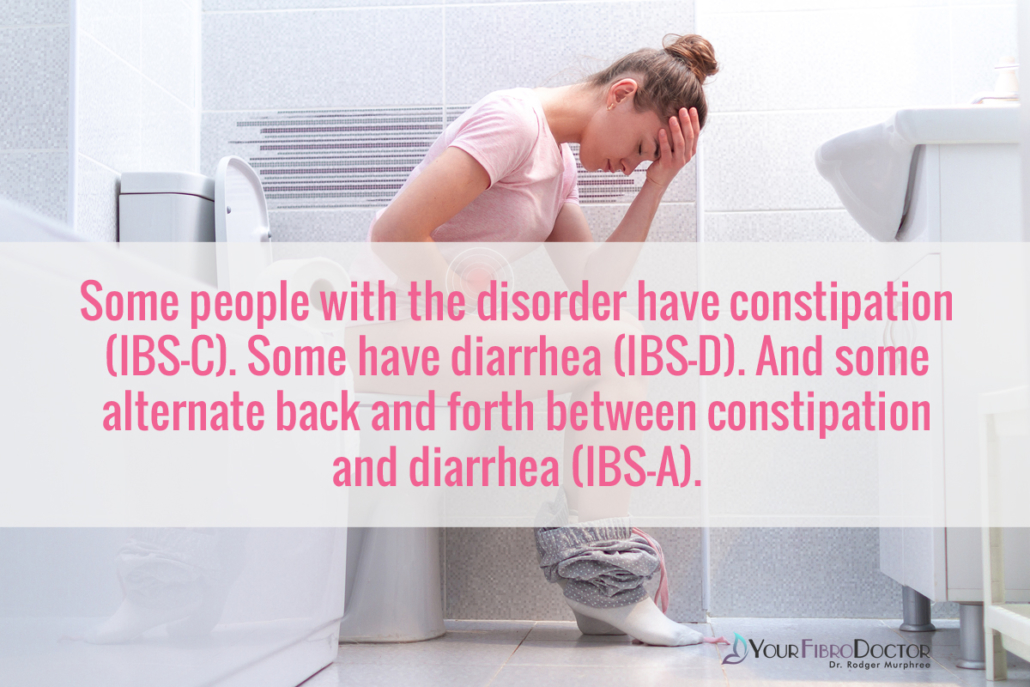
IBS symptoms result from what appears to be a disturbance in the interaction between the gut or intestines, the brain, and the autonomic nervous system that alters regulation of bowel motility (motor function) or sensory function.
Research has shown that the cause of IBS is related to neuroendocrine- immune system dysfunction (brain and stomach hormones). This connection is largely mediated by the neurotransmitter or brain hormone known as serotonin. The brain and gut are connected through the neuroreceptors (hormone docking stations) for serotonin, 5-hydroxytriptamine-3 (5-HT3) and 5-hydroxytriptamine-4 (5-HT4).
These serotonin receptors regulate the perception of intestinal pain and the GI motility (contractions that move food through the intestinal tract). Therefore serotonin controls how fast or how slow food moves through the intestinal tract. In fact, there are more serotonin receptors in the intestinal tract than there are in the brain. Ninety percent of serotonin receptors are in the intestinal tract.
Research suggests that IBS patients have extra sensitive pain receptors in the gastrointestinal tract, which may be related to low levels of serotonin (another link to fibromyalgia).
Decreased levels of serotonin may help explain why people with IBS are likely to be anxious, depressed or have fibromyalgia.
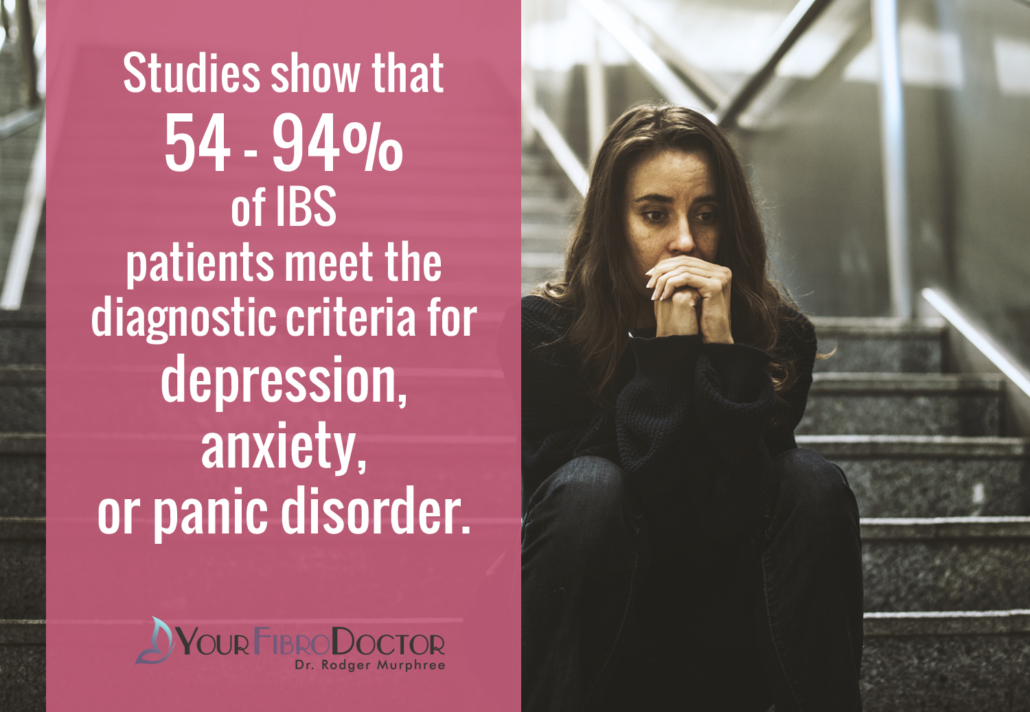
Restoring optimal levels of serotonin has been the focus of traditional drug therapy. Zelnorm, a 5-HT4 receptor agonist, was once hailed as “the drug” for IBS-c (IBS with frequent constipation), has recently pulled from the market for its association with heart attacks and stroke. The percentage of patients taking Zelnorm that had serious and life-threatening side effects was 10 times higher than the percentage of patients taking a placebo.
Even before this drug was recalled cardiovascular risks, many experts warned that this drug was dangerous for its other potential side effects including severe liver impairment, severe kidney impairment, bowel obstruction, diarrhea, constipation, abdominal pain, headaches, abdominal adhesions, gallbladder disease, and back pain. Antispasmodics (Levsin, Levsinex, Bentyl, Donnatal, etc.) are routinely prescribed for the treatment of IBS symptoms.
Potential side effects include:
bloating; blurred vision; clumsiness; constipation; decreased sweating; dizziness; drowsiness; dry mouth; excessive daytime drowsiness (“hangover effect”); feeling of a whirling motion; headache; light-headedness; nausea; nervousness; rash; hives; difficulty breathing; tightness in the chest; swelling of the mouth, face, lips, or tongue agitation; confusion; diarrhea; difficulty focusing eyes; disorientation; exaggerated feeling of well-being; excitement; fainting; fast or irregular heartbeat; hallucinations; loss of coordination; loss of taste; memory loss; muscle pain; pounding in the chest; severe or persistent trouble sleeping; trouble urinating; unusual weakness; very slow breathing; vision changes; vomiting.
Using potentially dangerous drugs to reduce symptoms, while ignoring natural and often more effective approaches is typical of what is wrong with “cookbook” (symptom-focused) medicine.
Reversing IBS With Nutritional Therapy
I find that IBS usually disappears rather quickly once my patient’s correct their poor eating habits (increase fiber, reduce simple sugars, caffeine and junk foods), uncover any hidden allergies when present, including gluten intolerance (Celiac disease), boost optimal stress coping chemicals (serotonin, magnesium, B-vitamins, etc.), restore bowel ecology (probiotics), and take the right digestive enzymes with their meals.
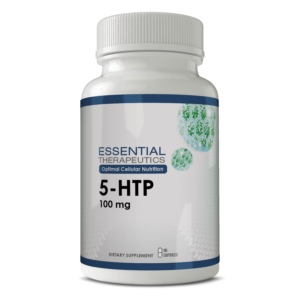 To boost serotonin levels I recommend patients take, the amino acid responsible for making serotonin, known as 5-hydroxytryptophan (5HTP). 5HTP along with the right vitamins and minerals, is responsible for making serotonin.
To boost serotonin levels I recommend patients take, the amino acid responsible for making serotonin, known as 5-hydroxytryptophan (5HTP). 5HTP along with the right vitamins and minerals, is responsible for making serotonin.
Patients should take 300-400mg a day with food or if have fibromyalgia and suffer with poor sleep, start with 100mg taken on empty stomach 30 minutes before bed with 4 ounces of grape juice and increase by 100mg each night up to 300mg.
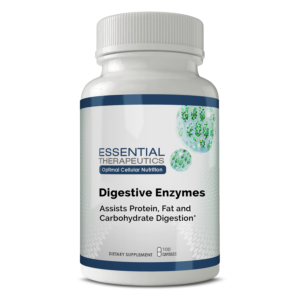 Most digestion and absorption takes place in the small intestine and is regulated by pancreatic enzymes (digestive) and bile. The pancreas aids in digestion by releasing proteolytic enzymes, which help break down proteins into amino acids. Natural digestive enzymes are found in raw fruits and vegetables. Processed foods are usually devoid of digestive enzymes.
Most digestion and absorption takes place in the small intestine and is regulated by pancreatic enzymes (digestive) and bile. The pancreas aids in digestion by releasing proteolytic enzymes, which help break down proteins into amino acids. Natural digestive enzymes are found in raw fruits and vegetables. Processed foods are usually devoid of digestive enzymes.
Over consumption of these processed foods can lead to digestive enzyme deficiencies. This may then lead to malabsorption and or intestinal permeability syndrome (bloating, gas, indigestion, diarrhea, constipation, and intestinal inflammation). To ensure proper digestion and absorption, I recommend taking pancreatic enzymes with each meal.
For stubborn IBS symptoms, I recommend using a high dose, pharmaceutical grade, pure digestive enzyme supplement.
I always recommend people take a good optimal daily allowance multivitamin / mineral formula. Patients with IBS have depleted their stress-coping chemicals (serotonin, magnesium, and vitamins) and this not only leads to IBS but also prevents them from overcoming IBS.
It is a vicious cycle that can only be broken by taking adequate amounts of essential vitamins, minerals and other nutrients I’ve already mentioned above. The mineral magnesium, which is involved in over 300 bodily processes, is particularly important for reversing the symptoms of IBS-c and IBS-A.
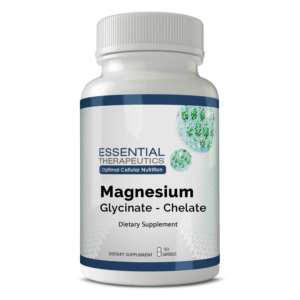 Magnesium helps relax the smooth muscle of the colon (natural laxative) allowing normal bowel movements. While a diet high in nutritious fiber is important, magnesium is even more important. A magnesium deficiency not only causes constipation but can also lead to heart disease, mitral valve prolapse (MVP), depression, anxiety, chronic muscle pain, headaches, migraines, fatigue, and many other unwanted health conditions.
Magnesium helps relax the smooth muscle of the colon (natural laxative) allowing normal bowel movements. While a diet high in nutritious fiber is important, magnesium is even more important. A magnesium deficiency not only causes constipation but can also lead to heart disease, mitral valve prolapse (MVP), depression, anxiety, chronic muscle pain, headaches, migraines, fatigue, and many other unwanted health conditions.
Those with IBS-c may need up to 1,000mg of magnesium each day. While those with IBS-d, may need less than 500mg.

The human intestines are inhabited by billions of beneficial bacteria. These bacteria, which are mostly located in the colon, aid in digestion by fermenting substances that were not digested in the small intestine and by breaking down any remaining nutrients. A healthy intestinal tract contains some 2-3 lb. of bacteria and other microorganisms, such as yeast, that normally don’t cause ay health problems.
However, when the intestinal tract is repetitively exposed to toxic substances (antibiotics, steroids, NSAIDs, etc.), these microorganisms begin to proliferate and create an imbalance in the bowel flora. Harmful organisms like yeast and some normally dormant bacteria, begin to overtake the good bacteria. This is known as intestinal dysbiosis.
IBS and small-intestinal bacterial overgrowth may share similar symptoms. One study showed that 78% IBS participants had small-intestinal bacterial overgrowth. To aid in digestion and prevent intestinal dysbiosis, patients with IBS should take probiotics (Lactobacillus and Biidobacterium) on a daily basis.
I recommend taking a high dose (9 billion strong), pure, enteric coated probiotic formula once a day on an empty stomach for 2-3 months.This approach isn’t guaranteed to solve every case of IBS. However, in the majority of my patients, their IBS symptoms are usually gone within two weeks.

MY GIFT TO THE FIBROMYALGIA COMMUNITY
FREE JUMP START YOUR HEALTH TRAINING SESSIONS.
EACH TUESDAY, NOON CDT
Join me Tuesday 4-21-20, and 4-28-20
Over the next few weeks I’ll be sharing 20 years worth of expert fibromyalgia advice.
ALSO – Each and every Wednesday I hold a Facebook LIVE Fibromyalgia Q&A. Tuesday training sessions will be just that, training sessions. Wednesdays will be reserved for general health information and Q&A –> Follow Us On Facebook, JOIN US on Wednesdays!
P.S. Are You Sick and Tired of Being Sick and Tired?
You can feel good again! 17 years specializing in fibromyalgia – I’ve helped thousands feel good again!
ARE YOU NEXT?
You don’t have to travel to Birmingham AL. 95% of my practice is phone consults.
Call 205-879-2383 for a $297 phone or in clinic consult today!
–> FIND OUT MORE HERE
P.P.S. –> The Immune Supplements are 15-35% OFF While Supplies Last!



 Most digestion and absorption takes place in the small intestine and is regulated by pancreatic enzymes (digestive) and bile. The pancreas aids in digestion by releasing proteolytic enzymes, which help break down proteins into amino acids. Natural digestive enzymes are found in raw fruits and vegetables. Processed foods are usually devoid of digestive enzymes.
Most digestion and absorption takes place in the small intestine and is regulated by pancreatic enzymes (digestive) and bile. The pancreas aids in digestion by releasing proteolytic enzymes, which help break down proteins into amino acids. Natural digestive enzymes are found in raw fruits and vegetables. Processed foods are usually devoid of digestive enzymes. Magnesium helps relax the smooth muscle of the colon (natural laxative) allowing normal bowel movements. While a diet high in nutritious fiber is important, magnesium is even more important. A magnesium deficiency not only causes constipation but can also lead to heart disease, mitral valve prolapse (MVP), depression, anxiety, chronic muscle pain, headaches, migraines, fatigue, and many other unwanted health conditions.
Magnesium helps relax the smooth muscle of the colon (natural laxative) allowing normal bowel movements. While a diet high in nutritious fiber is important, magnesium is even more important. A magnesium deficiency not only causes constipation but can also lead to heart disease, mitral valve prolapse (MVP), depression, anxiety, chronic muscle pain, headaches, migraines, fatigue, and many other unwanted health conditions.








Leave a Reply
Want to join the discussion?Feel free to contribute!